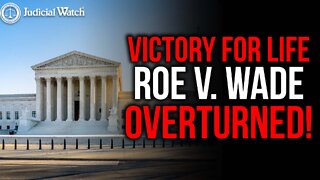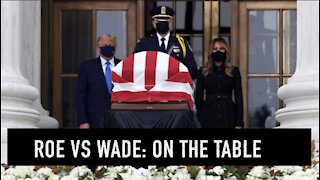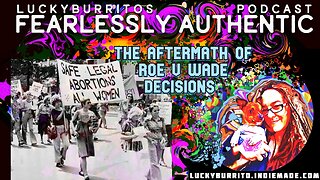RBG: Roe v. Wade Went Too Far
Ruth Bader Ginsburg argued Roe v. Wade set the pro-choice movement back by turning abortion into a lightning rod issue by having an unelected court of men making such a sweeping anti-democratic decision…
Ginsburg’s argument is supported by the experience of Europe where abortion was legalized via legislation and referenda rather than court action. She believed that had the Supreme Court’s decision been more limited in scope instead of sweeping in its affect then overtime, as was evidenced in her time, their would have been an even bigger bipartisan progressive movement for sweeping abortion reform, such as she saw for women’s workplace rights and no-fault divorce.
Now we may disagree on if democratically-elected state legislatures would have gone far enough on their own, but we can all agree that at the very least every liberal state would have become pro-choice.
The simple fact is that deciding when life begins, and therefore entitled to the protections of the American government, is not a legal question. It’s a socio-political-philosophical question: does life begin at conception, or 8 weeks when their are the first signs of heartbeat and brain function, or second trimester, or third trimester? Should legal protections be added as the baby develops? After all, the idea that "Women have a right to their own body,” isn’t a right that exists by law because so long as the government can prohibit your ability to consume whatever you want or do whatever you want with your body, i.e. drugs, prostitution, organs, nudity, suicide, cloning, human testing, social distancing, etc, then you do not have nor do you even believe you should have, “have a right to your own body.” The only time people say this talking point is to moralize their position in order to end debate on this complicated issue. It’s never used in reference to anything other than abortion so effectively what is actually being said is, “Women have a right to an abortion,” but stating your thesis is simply the beginning of a conversation and not the end.
The truth is that abortion is a matter of convenience, which isn’t to say its wrong because convenience drives most of human behavior, but convenience doesn’t hold the same moral weightiness as the idea of a god-given right. Again, I’m not saying abortion is wrong, but I’m just pointing out that the issue is complicated and therefore I agree with Ruth Bader Ginsberg that Roe v. Wade went too far in taking choice away from our elected bodies.
And I’m sure many of you are wondering, “But what about men’s rights in regards to abortion?” Okay, probably not, but attorney Melanie McCulley coined the term “male abortion” and Karen DeCrow, former president of the feminist organization, "The National Organization for Women" supports the above concept whereby early in the pregnancy men should be able to “relinquish all future parental rights and financial responsibility” in the name of gender equality. In other words, if a woman has a right to her body then shouldn’t a man at least have a right to his wallet? If a woman has a choice to keep the child or not then shouldn’t the man at least have the choice to pay or not? If you think the father shouldn’t have a choice then we are raising our boys wrong because we need to turn into an uber-conservative society where we only tell men to sleep with women who they’d be willing/ready to have a kid with because there’s always a chance the condom breaks, i.e. there's a 1% chance that “Netflix and chill” becomes “Netflix and child.”
Pro-choice advocates also argue, “History is on our side” as if history is always morally right, but nonetheless, history could be on the side of the pro-life movement because of the advancement of technology. What is convenient today may be inconvenient tomorrow.
-
 2:00:00
2:00:00
LeadAttorney
1 year ago $0.05 earnedLIVE COVERAGE: Roe v. Wade OVERTURNED TODAY!
266 -
 2:09:01
2:09:01
The Lead Attorney
1 year agoLIVE COVERAGE: Roe v. Wade OVERTURNED TODAY!
7.36K69 -
 15:07
15:07
Judicial Watch
1 year agoVICTORY FOR LIFE! Roe v. Wade is Overturned!
8613 -
 4:50
4:50
The Little Aussie Watchman
3 years ago $0.06 earnedThe day Ruth Ginsburg died ... Roe vs Wade is now in play
7942 -
 1:23:15
1:23:15
Galga TV
1 year agoAnti or Pro Abortion? Roe v Wade Overturned (Galga TV Podcast #5)
44 -
 6:50
6:50
American Center for Law and Justice
2 years agoThe Case to DEFEAT Abortion: Will SCOTUS Overturn Roe v. Wade?
1.52K10 -
 3:22:23
3:22:23
Fearlessly Authentic Podcast
1 year agoFearlessly Authentic - The Aftermath of Roe V Wade decisions
166 -
 1:57
1:57
RealAmericasVoice
11 months agoLessons from Roe v. Wade
1.69K1 -
 6:43
6:43
Live Core Productions
10 months agoProtesters At The United States Supreme Court After Roe Versus Wade
93 -
 3:58
3:58
NextNewsNetwork
1 year agoPope DECREES Final Verdict on Roe v. Wade! It’s So Surprising
1326